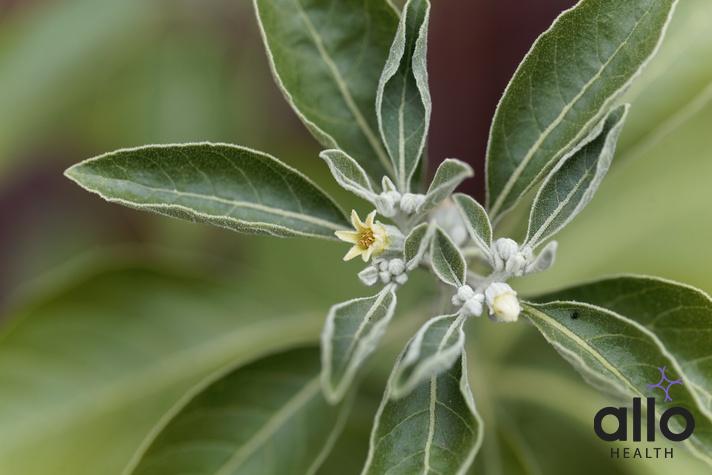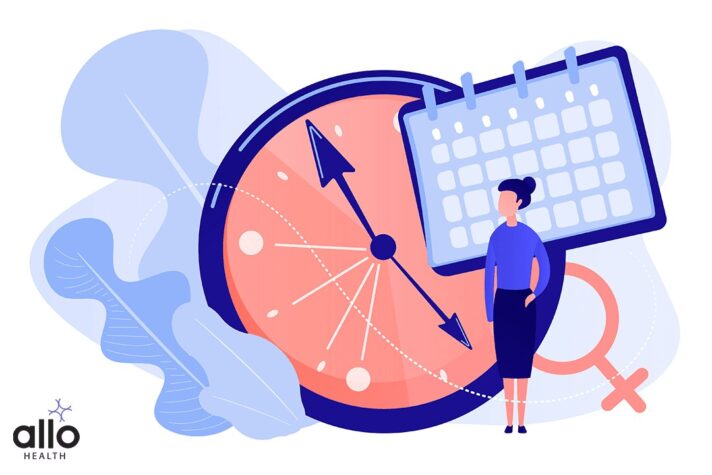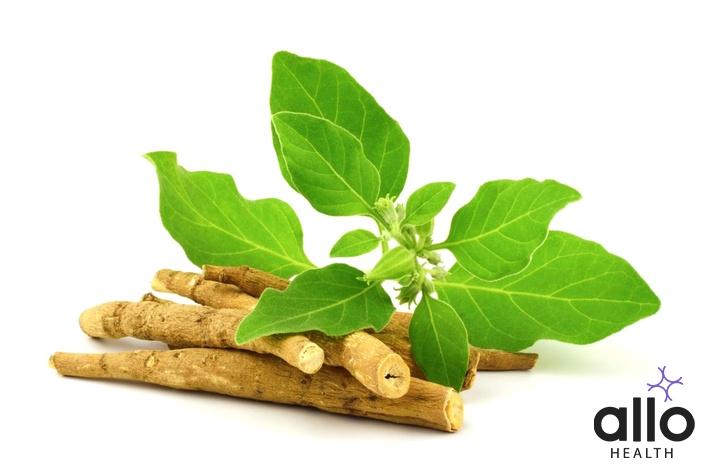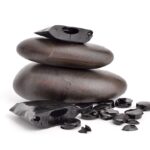Exploring The Natural Benefits of Ashwagandha for Menopause

Allo Health is dedicated to personalized well-being, offering support and trusted information tailored to individual health goals. The platform emphasizes human-generated content, led by a distinguished medical team of experts, including physicians and sexual health specialists. Their commitment to credibility involves rigorous fact-checking, authoritative research, and continuous updates to ensure accurate, up-to-date information. Allo Health's unique approach goes beyond conventional platforms, providing expert-led insights and a continuous commitment to excellence, with user feedback playing a crucial role in shaping the platform's authoritative voice.

Dr.Sushma.V completed MBBS degree from BGS GIMS,bangalore
Why This Was Upated?
Our experts continually monitor the health and wellness space, and we update our articles when new information became available.
Updated on 15 March, 2024
- Article was updated as part of our commitment to diversity, equity, and inclusion.

"The following blog article may discuss medical treatments and interventions. However, it is important to note that the information provided is for general educational purposes only and should not be considered as a substitute for professional medical advice, diagnosis, or treatment. Always seek the guidance of a qualified healthcare professional for personalized medical advice.
Book consultation
Medical treatments are complex and should be tailored to individual circumstances. The information presented in this blog may not be applicable to everyone, as each person's medical condition, history, and needs are unique. Only a qualified healthcare professional can evaluate your specific medical situation, consider relevant factors, and provide appropriate recommendations for diagnosis, treatment options, and monitoring.
It is crucial to note that self-diagnosis, self-medication, or relying solely on the information provided in this blog for treatment decisions can have serious health consequences. "
Menopause is a natural transition that women go through, marked by a variety of physical and emotional symptoms. In recent years, there has been growing interest in natural remedies to alleviate these symptoms and improve overall well-being during this stage of life. One such remedy that has gained attention is ashwagandha, a traditional herb used in Ayurvedic medicine. Known for its adaptogenic properties, ashwagandha is believed to offer a range of benefits for menopausal women, including hormonal balance, stress reduction, and improved mood. In this article, we will explore the potential natural benefits of ashwagandha specifically for menopause, backed by scientific research and anecdotal evidence.
What is Ashwagandha?
Ashwagandha, scientifically known as Withania somnifera, is a flowering shrub native to Asia and certain regions of Africa. It is also commonly referred to as Indian ginseng and winter cherry.
Within the practice of Ayurveda, a traditional system of medicine originating from India, ashwagandha holds significant importance as an herbal remedy.
Some individuals classify ashwagandha as a nootropic, a term used for supplements and herbs believed to enhance cognitive function.
Additionally, some proponents suggest that ashwagandha acts as an adaptogen, aiding the body in managing various forms of stress.
It’s worth noting that while the concept of adaptogens exists theoretically, there is limited conclusive evidence supporting the universal efficacy of all herbs classified as adaptogens in alleviating both mental and physical stress.
Effect of Ashwagandha
- Affect GABA receptors: GABA is a neurotransmitter that decreases nervous system activity. Analysis of compounds in ashwagandha suggests that the plant may affect GABA receptors, which could explain why it has a tranquilizing effect on some people.
- Reduce inflammation: Ashwagandha contains compounds that are steroids. Similarly to corticosteroids, these compounds reduce inflammation.
- Increase testosterone: Ashwagandha may increase Source testosterone in males, but it is unclear whether this also occurs in females.
- Increase thyroxine: Thyroxine is the main hormone the thyroid gland produces. There have been some case reports of high thyroxine levels in people taking ashwagandha, suggesting it may stimulate thyroxine production.
Understanding Menopause

Menopause is a natural biological process marking the end of a woman’s reproductive years. Typically occurring in their late 40s to early 50s, women experience a decline in estrogen and progesterone levels, leading to symptoms like hot flashes, night sweats, mood swings, and vaginal dryness. While menopause is a normal phase of life, managing its symptoms through lifestyle changes, hormone therapy, or other treatments can improve the quality of life.
How Ashwagandha Reduces Menopause Symptoms?
- A 2021 study investigated ashwagandha’s impact on menopause symptoms in humans. The study was randomized, double-blind, and placebo-controlled.
- Participants took either a placebo or 300 milligrams of ashwagandha root twice daily for 8 weeks.
- Researchers assessed menopause symptoms, quality of life, hot flashes frequency, and hormone levels.
- The ashwagandha group experienced reduced hot flashes and urinary symptoms. Ashwagandha may help to manage menstrual cycles as well.
- They also saw increased estradiol, FSH, and luteinizing hormone levels.
- However, their menopause-related quality of life score decreased.
- Testosterone levels did not differ significantly between the groups.
Ashwagandha: The Science Behind Its Benefits for Menopause

Ashwagandha, a popular herb in traditional Ayurvedic medicine, has gained attention for its potential benefits in managing menopause symptoms.
- Research suggests that ashwagandha may help alleviate common menopause symptoms such as hot flashes, mood swings, and sleep disturbances.
- The herb contains compounds like withanolides, which have been found to possess adaptogenic properties that can help the body adapt to stress and hormonal changes.
- Studies have shown that ashwagandha may help regulate hormonal balance by supporting the endocrine system, mental health, physical health, and other health concerns.
- Additionally, ashwagandha has been linked to improvements in mood, energy levels, symptoms of anxiety, chronic stress, and overall quality of life for menopausal women.
While more research is needed to fully understand ashwagandha’s effects on menopause, preliminary findings are promising and suggest it could be a valuable natural remedy for managing symptoms.
How does Ashwagandha help Manage Hot Flashes and Night Sweats?
This ayurvedic herb helps manage hot flashes and night sweats by regulating hormone levels in the body.
- It contains compounds like withanolides that have been shown to have estrogenic effects, which can alleviate symptoms of menopause.
- Ashwagandha also has anti-inflammatory properties that may reduce the severity of hot flashes and night sweats.
- By promoting relaxation and reducing stress hormones, Ashwagandha may indirectly decrease the frequency, mental stress, and intensity of these symptoms.
- Its antioxidant properties may also help protect against oxidative stress associated with menopausal symptoms.
Role of Ashwagandha in Improving Mood and Reducing Anxiety During Menopause
Ashwagandha, an adaptogenic herb, has been studied for its role in improving mood and reducing anxiety during menopause.
- Menopause is often accompanied by mood swings, anxiety, and stress due to hormonal fluctuations.
- Ashwagandha has been found to regulate cortisol levels, reducing stress and anxiety.
- It also supports the production of serotonin, a neurotransmitter that promotes feelings of well-being and happiness.
- Studies have shown that Ashwagandha supplementation can lead to significant improvements in mood and a reduction in anxiety symptoms during menopause.
- Its natural and holistic approach makes it a promising option for managing menopausal symptoms.
Ashwagandha for Bone Health Preventing Osteoporosis During Menopause
Ashwagandha, an adaptogenic herb, has been shown to support bone health.
- Menopause often leads to a decline in estrogen levels, which can increase the risk of osteoporosis.
- Ashwagandha has been found to help prevent bone loss by promoting osteoblast activity, which is responsible for bone formation.
- Studies have demonstrated that ashwagandha can improve bone mineral density, reducing the risk of fractures.
- The herb also exhibits anti-inflammatory properties, which may further protect against bone resorption.
- Incorporating ashwagandha into a menopausal woman’s diet or supplement regimen may contribute to maintaining strong and healthy bones.
However, consulting with a healthcare professional before starting any new supplement is advisable, especially for individuals with existing medical conditions or those taking medications.
Using Ashwagandha to Improve Brain Function and Memory During Menopause
Ashwagandha, an adaptogenic herb, shows promise in improving brain function and memory during menopause.
- Menopause can lead to cognitive decline and memory problems due to hormonal changes.
- Studies suggest that Ashwagandha may help alleviate these symptoms by reducing stress and inflammation.
- Its antioxidant properties may also protect the brain from damage caused by free radicals and help regulate hormones in women including cortisol and thyroid hormone.
- Ashwagandha has been found to enhance cognitive abilities such as attention, processing speed, sexual function, and memory in menopausal women.
- Incorporating Ashwagandha into a healthy lifestyle may offer a natural and effective way to support brain health during menopause.
How to Take Ashwagandha for Maximum Benefits During Menopause?
- Understand the proper dosage: Consult with a healthcare professional to determine the appropriate amount of ashwagandha for your specific needs during menopause.
- Choose the right form: Ashwagandha supplements come in various forms such as ashwagandha capsules, aswagandha powders, or tinctures. Select the one that suits you best.
- Consistency is key: Take ashwagandha consistently as directed to experience its full benefits over time.
- Consider timing: Some people find taking ashwagandha in the morning or before bed to be most effective.
- Monitor your symptoms: Pay attention to any changes in your menopausal symptoms and adjust your ashwagandha intake accordingly.
Other Natural Remedies for Menopausal Symptoms
Other natural remedies that have been shown to help manage menopausal symptoms include black cohosh, red clover, and soy. While these remedies, or herbal supplements have their benefits, ashwagandha root extract is a more versatile and potent herb that has a wider range of health benefits.
- Black cohosh is a popular herb that has been used for centuries to treat menopausal symptoms such as hot flashes, mood swings, yeast infection, and vaginal dryness. It is believed to work by mimicking the effects of estrogen in the body. However, studies have shown mixed results on its effectiveness, and it may not be suitable for women with liver complications.
- Red clover is another herb that contains natural compounds called isoflavones, which are similar to estrogen. It has been shown to reduce hot flashes and improve bone density in menopausal women. However, it may interact with certain medications and should be used with caution.
Conclusion
In conclusion, Ashwagandha offers promising natural benefits for managing menopausal symptoms. Its adaptogenic properties help reduce stress, anxiety, and hot flashes while improving mood and sleep quality. Furthermore, Ashwagandha’s anti-inflammatory and antioxidant effects may contribute to overall well-being during this transitional phase. However, more research is needed to fully understand its efficacy and optimal dosage. Nonetheless, incorporating Ashwagandha into a holistic approach to menopause management may provide women with safe and effective relief from troublesome symptoms.
Most Asked Questions
-
What is Ashwagandha and how does it relate to menopause?
Ashwagandha is a medicinal herb used in traditional Ayurvedic medicine. It has been studied for its potential benefits in managing menopausal symptoms due to its adaptogenic properties.
-
What are the natural benefits of Ashwagandha for menopause?
Ashwagandha may help alleviate symptoms such as hot flashes, mood swings, and sleep disturbances commonly experienced during menopause. It is believed to balance hormone levels and reduce stress, promoting overall well-being.
-
How should Ashwagandha be consumed for menopausal benefits?
Ashwagandha supplements are available in various forms, including capsules, powders, and teas. It is typically recommended to follow the dosage instructions provided on the product packaging or consult with a healthcare professional for personalized guidance.
-
Are there any side effects or precautions associated with Ashwagandha use during menopause?
While Ashwagandha is generally considered safe for most people, some individuals may experience mild side effects such as digestive issues or allergic reactions. It is advisable to consult with a healthcare provider before starting any new supplement regimen, especially for those with pre-existing medical conditions or taking medications.
-
Are there any contraindications for using Ashwagandha alongside other menopausal treatments?
There is limited research on potential interactions between Ashwagandha and conventional menopausal treatments. It is advisable to inform your healthcare provider about all supplements and medications you are taking to avoid any potential adverse effects or interactions.






































